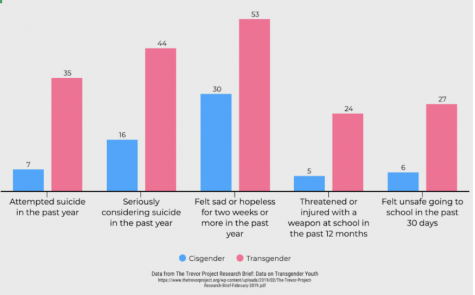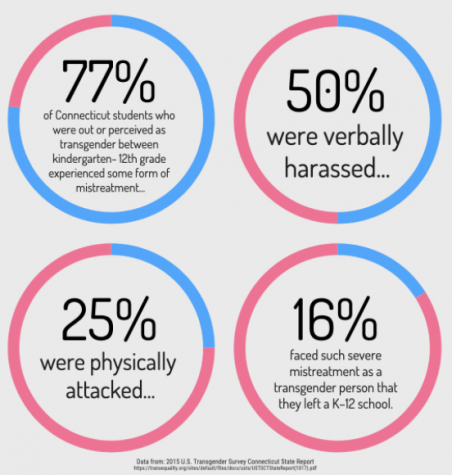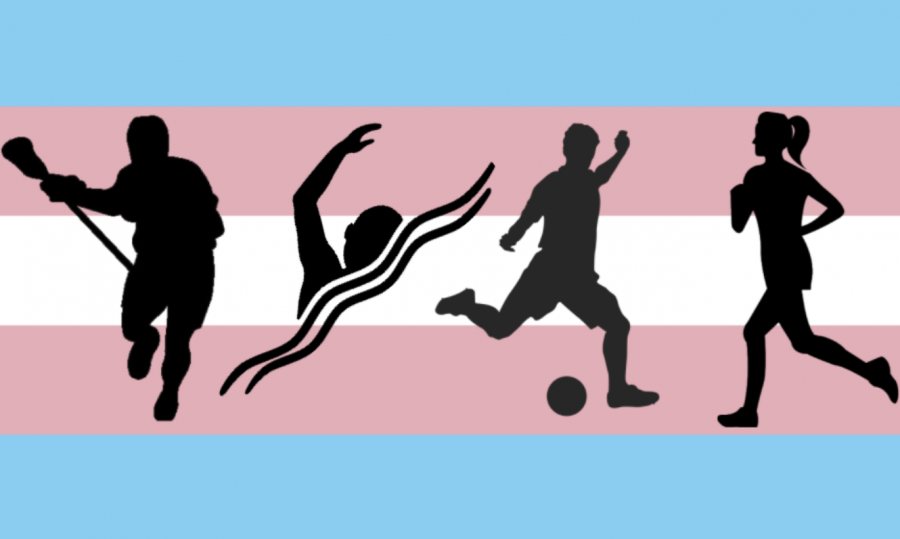Transgender athletes should be allowed to participate in high school sports
The Connecticut lawsuit aiming to ban transgender athletes from particiapting in high school sports was dismissed April 2021. This case along with many others across the country has sparked national debate with two very passionate sides. It is crucial that transgender athletes are allowed to particiapte in high school sports based on their gender identity.
I’ve been competitively swimming since I was in second grade. Over these nine years, a lot has changed in my life, but swimming has stayed the same. This sport has led me to meet some of my best friends, provided an escape from the stresses of school and has taught me many valuable life lessons from time management to discipline. Sports are a formative experience that should be open to students of any and all gender identities.
In February of 2020, four cisgender female student athletes in Connecticut filed a lawsuit against the Connecticut Interscholastic Athletic Conference (CIAC) and the boards of education for their respective towns. The students aimed to block transgender atheltes from particiapting in girls’ sports claiming that “the CIAC policy puts non-transgender girls at a competitive disadvantage in girls’ track and, as a result, denies them rights guaranteed by Title IX of the Education Amendments.”
In April of 2021, the lawsuit was dismissed. According to the judge, the transgender athletes at the center of the lawsuit had graduated and the plaintiffs couldn’t identify any current transgender athletes, so the issue had been resolved. However, in his ruling, the judge explained, “If it turns out that a transgender student does register to compete in girls’ track next season [the plaintiffs] will be able to file a new action under Title IX along with a motion for a preliminary injunction.” The plaintiffs have said they plan to appeal.
In recent years, many similar lawsuits have taken place across the country, inciting a national debate on whether or not transgender athletes should be allowed to participate in women’s sports. The main claims deny science and are often even transphobic. Some have used the slogan of protecting the integrity of high school sports as a means to spew transphobic hate. It is crucial that transgender students are not discriminated against and allowed to particiapte in high school sports.
One of the primary points of reasoning to those who oppose transgender athletes is that they have a genetic advantage. However, according to Dr. Joshua D. Safer, a doctor who has studied transgender medicine, “A person’s genetic make-up and internal and external reproductive anatomy are not useful indicators of athletic performance” He also claims that “there is a medical consensus that the difference in testosterone is generally the primary known driver of differences in athletic performance between elite male athletes and elite female athletes”
Since science reflects no genetic advantage for transgender athletes, it is wrong for transgender youth to be denied the opportunity to participate in high school sports.
It is also important to take a holistic view on this issue and examine the immense value of transgender particiaption in sports beyond in a social scene. Many transgender students struggling with bullying and harrasement in school, and denying them the opportunity to participate in sports further exacerbates this issue.
A study from February of 2019, showed that compared to cisgender students, transgender youth have higher rates of suicide attempts, depression and generally feel less safe at school (see top graphic below). Another Connecticut specific study from 2015 showed that transgender students expiriences various amounts of mistreatment at school (see bottom graphic)


Yet students who play sports are generally less depressed, have higher self esteem, and the social interactions of team sports create even happier student athletes. If they were willing and allowed to participate, sports could be an effective outlet for transgender students to counteract the abuse endured.
For transgender youth, participating in sports can be one way to become more comfortable at school. Teams create such a valuable community that shouldn’t be denied to any students because of their gender identity.





















































